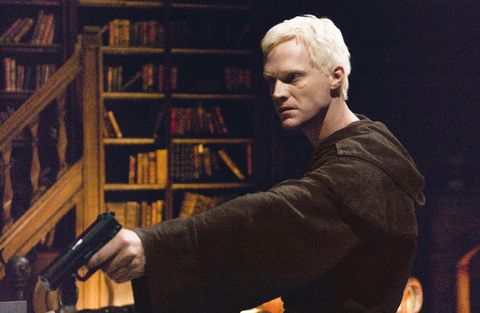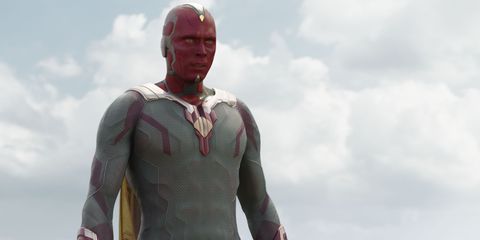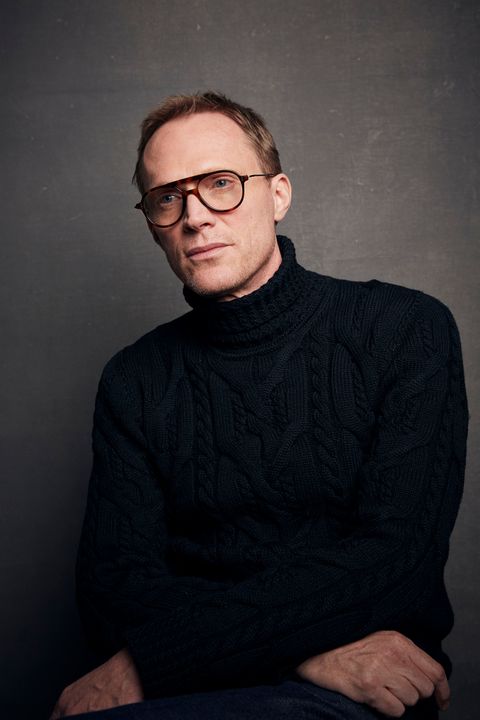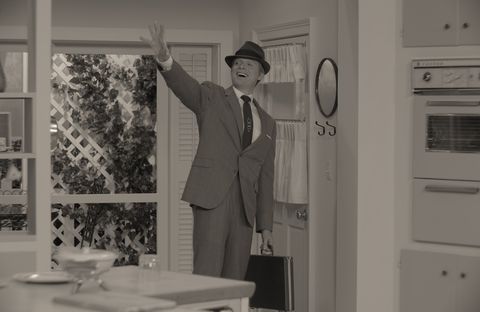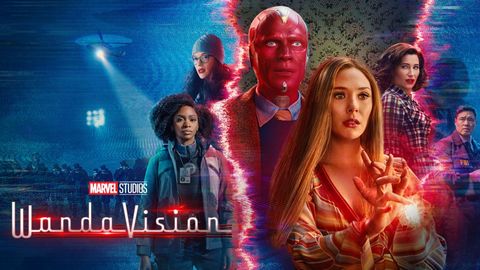The following contains spoilers for the WandaVision finale.
Paul Bettany’s in front of a live studio audience—lights camera everything, dressed as a purple-green robot in a top hat, wailing “WANDA, DEAR!” and blowing air kisses like it’s I Love Lucy. WandaVision‘s pilot episode, “Filmed Before a Live Studio Audience,” was quite literally filmed before a live studio audience. Chaos for Bettany, who didn’t really want to subject himself at first to saying things like “My wife and her flying saucers!” in front of living, breathing, probably confused people. He bumps into Kathryn Hahn at the backstage prop table, rushing to get to his mark. Lobsters fly around the kitchen, strung by fishing wire. Pots and pans too. Bettany sings “Yakety Yak” and everyone cheers.
“The director, Matt Shakman, decided it would be a really good idea to shoot it in front of a live audience, which is how those shows were shot,” Bettany says over Zoom a few days out from WandaVision‘s finale. He’s talking about series like The Dick Van Dyke Show and I Dream of Jeanie, where WandaVision‘s early episodes took inspiration. “I didn’t want to do it, because I hadn’t been in front of a studio audience forever. I was very nervous about the whole thing—but he was right.”
Filming a ’50s-inspired episode how they actually filmed it in the ’50s should already tell you that WandaVision is weird. Very weird. What might have been Marvel’s toughest sell of all—a witch traps herself and her robot boyfriend inside an endless sitcom—has become the most popular show on TV. But that might even be underselling WandaVision, which is less about things going boom and more about one woman coping with unimaginable loss. For many fans? It’s been medicine for a grieving world. As for the superhero stuff, WandaVision‘s faithful are entirely spellbound. So much that Marvel-adjacent Reddit forums—where viewers toil away trying to crack WandaVision‘s mysteries—probably see as much activity as r/Daytrading. Bettany’s having a blast with all of it. At Esquire‘s expense, actually. A few weeks ago, he fed us a bullshit spoiler that sent the fandom into mass anaphylactic shock. I tried to get him back. More on that later.
It’s hard to blame Bettany, who waited 13 years for Vision to get a proper introduction to the MCU, for enjoying his victory lap. If you look back on his madcap career, you might just find that all of it—friendship with Heath Ledger, his transatlantic move, and his Marvel origins as Tony Stark’s very polite and very British AI, JARVIS—led to his career-defining turn in WandaVision, where he just spoke the best seven words in Marvel’s history. With WandaVision‘s finale leaving the door thiiiis cracked for more Vision in the MCU, Bettany told us how long he’s willing to suit up as the synthezoid—and gave the true story of his road to realizing Marvel’s American dream.
Paul Bettany’s American dream, at present, resides in New York, NY. (The short version of his UK to U.S. move: “The reason I’m still in New York is I was here in the ’90s, and it fucking rocked.”) New York doesn’t quite fucking rock as much nowadays, but he lives there with his also-famous celebrity wife (Jennifer Connelly) and children. Last week, Connelly told Jimmy Kimmel that she and Bettany set up a roller disco in their basement for their kids, a ridiculous story that bears fact-checking because it sounds so damn cool.
“Yes, it’s fucking true,” Bettany says. “This is a very overblown way of saying we put a lot of fairy lights up, basically. But it looks pretty cool down there. It might be twice a week, we’ll go down and put on disco music and roller skate around the basement.”
This is a good time to say, for the record, that Paul Bettany is exceedingly kind, but Zooming with him is like entering a dark-humored, chaotic, and only occasionally scary Hex. He called a bit late because the last interview ran over, blurting into his laptop camera, “Now, while we have this meeting, can I bring you with me and make a cup of coffee, because I’m about to lose my fucking mind?” He’s witty, wicked tall, like 6’3 tall, full of odd but weirdly poignant bits of advice from his Auntie Jill (“Neurosis is only attractive when you’re young!”), and prone to fits of trolling and self-reflection. Whatever energy it is, there’s a lot of it, and it was enough to beam him from London to Hollywood after only a couple years in theater school.
But Paul Bettany’s career, maybe even his entire life, is better separated by everything that came before and after the time he punched Tom Hanks so hard in the stomach that he farted. It’s true. Tom Hanks farts. Really goddamn loud, actually. Ripped ass on the first day of shooting The Da Vinci Code in 2005. Bettany, playing a tortured albino monk, had to square up against Prof. Langdon. Fight scenes are technically stunts, so the whole set is pin-drop quiet, in case someone gets hurt. Bettany lays one right into the gut of America’s Dad.
“Gargantuan fart,” Bettany says.
I didn’t have the nerve to ask if Tom Hanks’s farts smelled, because I would forever think of Tom Hanks’s big smelly farts every time I saw Tom Hanks in anything ever again. But I imagine that Tom Hanks’s farts smell like a public library.
“I was like, Holy shit, what am I going to do? It’s Tom Hanks, the biggest star in the world, and I’ve just made him fart. He looked at me and I looked at him. And he went, ‘What’s wrong with you?’”
Before the fart, when the world met Paul Bettany, he was very naked, trudging down a dirt road in Prague smiling a weird goofy smile and sucking boo-boos on his foot. His first big Hollywood part—after theater school and a spot in Bent, an Ian McKellen-led Holocaust drama—came as Geoffrey Chaucer in 2001’s A Knight’s Tale. The medieval-sports-action-romance-comedy stars Heath Ledger as a hopeful jousting champion. At the time, the film pulled a solid haul at the box office. But you need to watch it in 2021. It holds up. And, Bettany’s take on Chaucer—as a good-hearted flake who’s so deep in gambling debt that he’s homeless and coinless and pantsless when he makes his intro—was compelling enough to launch a career. “I don’t think Sony knew what to do with that movie at all,” Bettany says. “I still have people on the streets, when they recognize me: “HEY, NAKED GUY!”
I tell him that the film’s 20th anniversary is this May. Bettany looks like I just took a lance and smashed him in the chest.
“Jesus Christ.”
He takes a second. Gets back on the horse. “It caught everybody at a moment where everything seemed possible,” he says. “That was a bonkers movie.” No shit. The camera, both in the jousting and a dance scene of a lifetime—a medieval jingle that turns into a singalong of Bowie’s “Golden Years”—feels like it’s being operated by a sprinting 10-year-old boy jacked up on Mountain Dew. (Bettany breaks into a Bowie growl: “Gooooooolden years…”) Alan Tudyk screams, “I WILL FLOG YOU” like twenty-five times. They stuffed dried pasta in the lances so that when they exploded, the splinters would rocket everywhere and look extra splintery. The film’s two-and-a-half-hour runtime feels like 15 minutes. Your proxy is Ledger, who is very much having the time of his life, laughing and crying and dancing and jousting, the beating heart at the center of this very strange film.
“Beautiful boy, he was,” Bettany says, remembering Ledger, who died of an accidental overdose over a decade ago. “He was special and everybody knew it. You just feel it. There’s been such nonsense spoken about the darkness of Heath Ledger, and I never saw it. I just saw somebody full of light and somebody who was inquisitive about the world and sometimes curious. And curiosity can be dangerous. But I only remember him with light. In fact, it’s incredibly difficult for me to think about him dead, because he was so alive all of the time.”
This content is imported from YouTube. You may be able to find the same content in another format, or you may be able to find more information, at their web site.
After A Knight’s Tale, Bettany strings together roles in A Beautiful Mind, Master and Commander, and Wimbledon. For the tennis rom-com, Bettany spent eight months learning how to throw a ball in the air and convincingly smack it hard enough with a racket so that you’d believe he was a professional tennis player. With Bettany as the lead opposite Kirsten Dunst, Wimbledon is the kind of star-making ’00s rom-com that has “Just What I Needed” in the trailer and voiceover from the guy who did all the movie preview voiceovers in the ’00s. More importantly, Wimbledon also casted the man who would direct the first installment of a cinematic superhero universe that would earn precisely eight trillion dollars and achieve feats roughly on par with the first transatlantic flight, or the invention of the chocolate chip cookie.
“Jon Favreau rung me up and said he was looking for somebody without any personality whatsoever to play the disembodied voice of a computer, and he thought of me.” Bettany says. “I just thought, Such a charming, generous pitch. I’m in.“
A.F. begins with 2008’s Iron Man, where Bettany voices JARVIS, Tony Stark’s fancy Alexa. For Iron Man, its two sequels, and one Avengers movie, he says things like “The proposed element should serve as a viable replacement for palladium” and “My diagnosis is that you’ve experienced a severe anxiety attack” and “The Clean Slate Protocol, sir?” After Iron Man 3, a producer tells Bettany, who just spent a half-decade voicing a smart home, that he’s done in Hollywood. Bettany thinks this producer might be right, but fights him about it anyway. Immediately after the meeting, he gets a call from an unknown number. It’s Joss Whedon, who asks Bettany if he wants to take on the role of a certain synthezoid in the next Avengers movie. Says yes on the spot.
So, 14 years after the trudging of Geoffrey Chaucer, Bettany—clear eyes, bare ass, can’t lose—is naked again. It’s 2015’s Avengers: Age of Ultron, where Hulk and Iron Man are making a baby. There’s fog, lots of it, and superhero movie computer noises, the beeping and blooping and whooshing. Bettany appears, looking triumphant and ridiculous, dipped in purple, speckled green, amber stone lodged in his forehead; JARVIS is now somewhere between man, machine, and something new altogether. Hemsworth and Evans, Ruffalo and Renner, Olsen, and Downey, Jr, are all there for the delivery. Bettany is Vision now, and maybe even forever, seven years away from the most important words he may ever speak.
For one funny-if-it-wasn’t-so-sad minute, it looked like Bettany’s Vision was about to leave the MCU as soon as he appeared in it. In Avengers: Infinity War, he convinces Wanda to destroy that big stone in his head, effectively killing him, because the bad guy will take it otherwise. It’s sad. But the bad guy shows up anyway and puts Vision together again, just so he can rip the stone out himself and kill him a second time! Superheroes, man. After the double deaths, Marvel called Bettany in for a meeting. He preemptively started giving thank yous because he thought they were about to fire him, considering they mutilated his character twice. Marvel pitched WandaVision instead. In WandaVision, Wanda resurrects Vision inside of a rather large magical bubble. The catch: She’s mind-controlled everyone, even herself to an extent, into believing they live in a laugh-tracked American sitcom. Each episode gleefully homages the big ones: The Dick Van Dyke Show, Family Ties, Full House, Malcolm in the Middle, Modern Family. Really, though, it’s a show about a woman processing her grief.
Bettany said it a little better.
“I’ve heard it said, often by people who have not seen the films, that these Marvel superhero movies are always the same. And they’re really not. They’re self-consciously different. There’s this idea from people who haven’t seen them who remember superhero movies from the ’80s and whatever, that the success has been in repeating a formula. The success has been that they’re made by fans who love this incredibly rich source material. We managed to make a TV show that celebrates the golden era of American television, and is also about grief. I think that’s fucking funny, and weird, and a great thing to be a part of.”
In WandaVision, Bettany’s made a purple and green robot one of Marvel’s most human characters. He plays his alter-egoed android with staggering sincerity, questioning his fellow Avengers, especially Wanda, with a curiosity that would make you think there’s a heart under all those wires. Bettany says Vision stands for decency, which might just be 2021’s most aspirational superpower. “At his core, Vision is decent. Uncluttered, ego-less, timeless… Therefore, [he] loves in a very clear and uncluttered and uncomplicated way.”
Bettany, like Wanda, like me, like you, like all of us, has his trauma, his pain, and his problems, which may or may have not informed his acting alongside a character full to the brim with trauma and pain and problems. He lost his own brother when he was young. But now, we’re talking about Auntie Jill—who Bettany’s said had a major impact on his early life—and her advice to pocket the neuroses around your 30s. Bettany thinks you should also grow out of telling your dreams because nobody’s fucking interested. And stop adding shit to your spaghetti bolognese, because it’s fine already. Push yourself out the door, too, even though it’s a pandemic. “It makes this stuff really peculiar as you get older,” he adds, the stuff in question being this magazine interview.
“You’re speaking to somebody who has been seeing a therapist for longer than they have not been seeing a therapist,” he says. “But I’m definitely Humpty Dumpty, and all the King’s horses and all the King’s men are never going to put Humpty together again. But I can kind of keep it together, and I can absolutely keep it to myself, and I have become more self-contained as I’ve got older.”
Unfortunately, now is the time when we need to hammer Humpty for spoilers. Since 2008, in the life of anyone who’s ever talked to Paul Bettany, there comes a time when you must pry for a tease, please. It’s trying to open a steel vault with a matchstick while you’re wearing a clown suit. You just have to pray someone like Paul Bettany doesn’t squeeze your big honking clown nose and call you a dummy.
We know Paul Bettany’s the kind of guy who enjoys that stuff.
You see, Paul Bettany’s cheeky fella. A few weeks ago, he told Esquire that WandaVision’s finale would gift us a cameo no one’s guessed yet. Someone he’s always wanted to work with. Three sentences from the troll in question spun Marvel fans for weeks, trying to guess the mystery character. Professor X? Reed Richards? Tupac? Nemo from Finding Nemo? Just about every other superhero-show-covering outlet covered Paul’s tease, too.
Cut to the penultimate episode. The mid-credits scene shows an all-white doppelgänger of Bettany’s character, Vision.
It’s Paul Bettany. The cameo Paul Bettany teased is Paul Bettany. Paul Bettany said he always wanted to work with Paul Bettany—that Paul Bettany is WandaVision’s secret cameo—and this is why I hope Paul Bettany gets trapped in the Friends episode where Mike has to look after Phoebe’s rats.
Bettany’s splayed out on a fuzzy-looking couch. I figure I’ll play the slow game, fight troll with troll, and ask him what his favorite fan theory is.
He’s so proud that he blurts it out.
“It was very funny because I started a rumor myself.”
Paul, that was to us. That was an Esquire video, I say.
Bettany either doesn’t hear this attempted confrontation, or is just flat-out willingly ignoring it. It doesn’t matter; he’s getting stronger on the other end of the screen, sinking deeper into the fuzzy couch, suddenly realizing the full brunt of his superpowers.
“I was like, ‘Oh yeah, it’s going to be this cameo from this actor that I can’t wait to work with. I’ve admired him for years!” And then people started coming up with their own ideas… Then I was like, “Oh my God, people are going to find out that I’ve teased Paul Bettany and he’s already in it. I wish it was Patrick Stewart now.’”
There were 30-some articles this week saying that you trolled us, I insist.
He hears me this time. Launches backward into the fuzzy couch and starts cackling so hard that Vision’s third death nearly happened at that very moment.
“That was funny!”
OK, yeah, it was pretty funny. When you have Tom Holland spoiling endings to entire theaters full of fans, you have to respect the guy poking fun at the tea-leaf-reading subculture surrounding anything and everything superhero. At risk of further trolling, it’s time to take out the matchstick and pry—nay, beg—for a spoilerly crumb that would hint at Vision’s future in the MCU. Because it turns out that Vision does, in fact, meet his third untimely death. Poor Paul. In WandaVision‘s finale, Wanda dissolves the Hex—leaving her with about a hundred mortal enemies in Westview’s angry New Jerseyans. Wanda’s recreation of Vision, a living memory, goes away with the Hex too. But not without imbuing the doppelgänger Vision with his knowledge of everything that’s happened to the synthezoid in the MCU. That’s all to say—we could conceivably see a standalone Vision story someday. Here’s what Vision’s future might look like, per a seemingly-not-trolling Bettany.
“Well, fuck. How do I do this without spoilers? I guess we’ve seen what happens to Wanda when love is taken away from her.”
Mhm.
“And I wonder what that would look like with Vision.”
He’s thinking. Leans further back. The fuzzy couch receives him. He starts speaking in the first person as Vision.
“I mean, that’s the thing, right? I’ve never had a loved one to lose… I don’t know what grief is because I’ve never had a loved one to lose.” Regardless, Bettany decides that Vision’s third death would cut the deepest. Man and robot should never die at least more than twice. “There is so much to get into with him because it’s been ten minutes here, ten minutes there, in the movies,” he adds. “Now we’re sort of just starting to sort of peel back some stuff.”
Good news on that front. If anything, besides the love and loss, the lobsters and live audiences, cumulative pounds of makeup and a Robert Redford wig, WandaVision introduced an existential crisis for any actor signing the dotted line on a Marvel contract. The multiverse. In superhero science, that means that there are an infinite amount of parallel universes out there. Captain America dies? Well, here’s a Captain America from this other dimension, so Chris Evans is back, baby. Really, Vision could die seven more times and Wanda could go find another Vision in another spot in the multiverse. Paul Bettany, the man who has already seen three versions of Vision in the MCU, is well aware of this particular feedback loop.
Are you going to play Vision forever?
“I love Vision. Yes, I’m in.”
Heaven forbid, if this really was the last time the Brit painted himself purple: Bettany, by way of Vision, left us with a gift. During WandaVision’s filming, Bettany and Olsen were rehearsing a scene set in the Avengers compound. It’s around the event of 2016’s Captain America: Civil War. Wanda’s mourning her brother, Pietro. Vision doesn’t quite compute this grief. He’s a robot, you know, as much as Bettany’s performance would have you think otherwise.
This content is imported from YouTube. You may be able to find the same content in another format, or you may be able to find more information, at their web site.
Something’s off with the scene. Bettany goes to Jac Schaeffer, WandaVision’s head writer. “I just don’t think the scene in the Avengers compound is doing what we need it to do,” he says. “I think it needs to be somehow about the purpose of grief and that grief isn’t all bad.” She comes back with this speech.
“It can’t all be sorrow, can it?” Vision asks Wanda in the final cut. “I’ve always been alone, so I don’t feel the lack. It’s all I’ve ever known. I’ve never experienced loss because I’ve never had a loved one to lose. But what is grief, if not love persevering?”
The final line—what if grief, if not love persevering?—feels entirely conceived in this time, formed inside our prolonged lucid dream, this state of shock-paralysis the pandemic has us living in. WandaVision fans have dubbed the line, spoken with blistering truth by Bettany, the show’s defining moment. In WandaVision, fans have found medicine by way of its meditation on grief, a lesson in how to not only persevere through it, but how to move forward clutching that pain by our sides. Jac, Paul, Elisabeth, WandaVision: They’ve given us a way to begin to thaw from a year in this cryogenic chamber, awake, ready to feel again.
If this was Vision’s goodbye? Let’s say this, Paul Bettany.
Long live Vision, protector of this very universe and all the other ones too. Long live our sitcoms, our silly wigs and toaster commercials and fourth walls. Long live our hopes, and our dreams, and our grief. Long live the things no blip or snap or pandemic can take away. Long live Paul Bettany, protector of Vision, our very model of human decency, may you live forever too, and keep trolling and trolling and trolling each and every one of us, as long as you very well please.
This content is created and maintained by a third party, and imported onto this page to help users provide their email addresses. You may be able to find more information about this and similar content at piano.io



